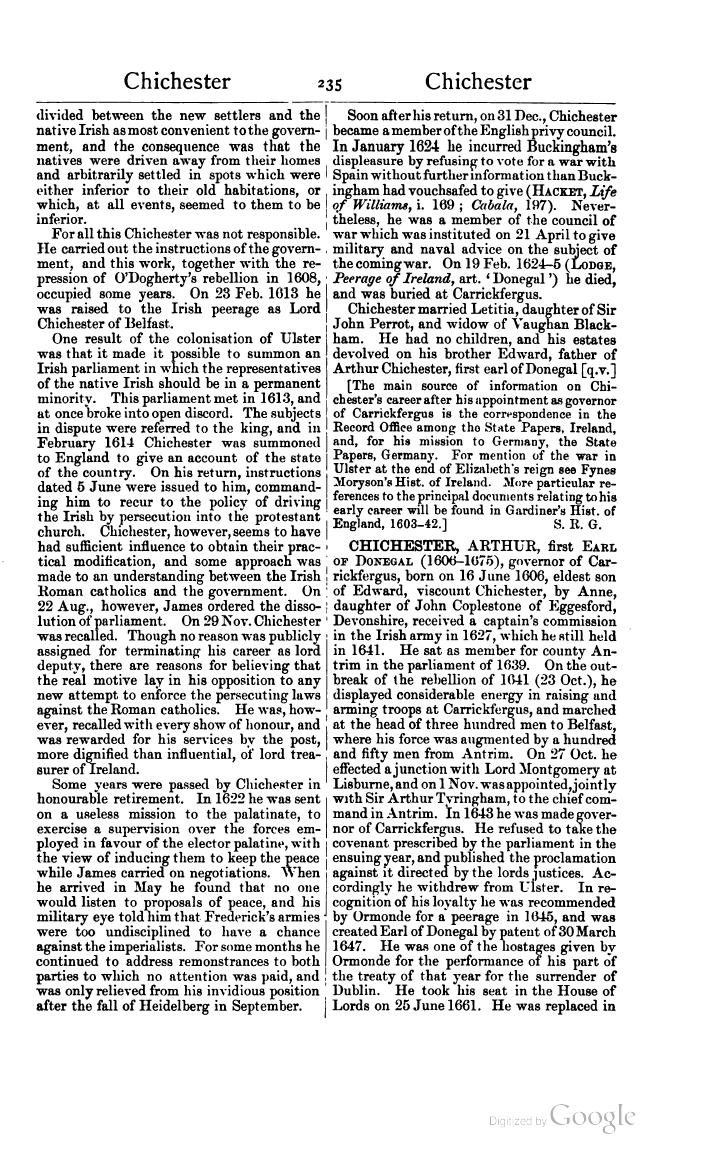divided between the new settlers and the native Irish as most convenient to the government, and the consequence was that the natives were driven away from their homes and arbitrarily settled in spots which were either inferior to their old habitations, or which, at all events, seemed to them to be inferior.
For all this Chichester was not responsible. He carried out the instructions of the government, and this work, together with the repression of O'Dogherty's rebellion in 1608, occupied some years. On 23 Feb. 1613 he was raised to the Irish peerage as Lord Chichester of Belfast.
One result of the colonisation of Ulster was that it made it possible to summon an Irish parliament in which the representatives of the native Irish should be in a permanent minority. This parliament met in 1613, and at once broke into open discord. The subjects in dispute were referred to the king, and in February 1614 Chichester was summoned to England to give an account of the state of the country. On his return, instructions dated 5 June were issued to him, commanding him to recur to the policy of driving the Irish by persecution into the protestant church. Chichester, however, seems to have had sufficient influence to obtain their practical modification, and some approach was made to an understanding between the Irish Roman catholics and the government. On 22 Aug., however, James ordered the dissolution of parliament. On 29 Nov. Chichester was recalled. Though no reason was publicly assigned for terminating his career as lord deputy, there are reasons for believing that the real motive lay in his opposition to any new attempt to enforce the persecuting laws against the Roman catholics. He was, however, recalled with every show of honour, and was rewarded for his services by the post, more dignified than influential, of lord treasurer of Ireland.
Some years were passed by Chichester in honourable retirement. In 1622 he was sent on a useless mission to the palatinate, to exercise a supervision over the forces employed in favour of the elector palatine, with the view of inducing them to keep the peace while James carried on negotiations. When he arrived in May he found that no one would listen to proposals of peace, and his military eye told nim that Freaerick*s armies were too undisciplined to have a chance against the imperialists. For some months he continued to address remonstrances to both parties to which no attention was paid, and was only relieved from his invidious position after the hH of Heidelberg in September.
Soon after his return, on 31 Dec, Chichester became a member of the English privy council. In January 1624 he incurred Buckingham's displeasure by refusing to vote for a war with Spain without further information than Buckingham had vouchsafed to give (Hacket, Life of Williams, i. 169 ; Cabala, 197). Nevertheless, he was a member of the council of war which was instituted on 21 April to give military and naval advice on the subject of the coming war. On 19 Feb. 1624-5 (Lodge, Peerage of Ireland, art. 'Donegal') he died, and was buried at Carrickfergus.
Chichester married Letitia, daughter of Sir John Perrot, and widow of Vaughan Blackham. He had no children, and his estates devolved on his brother Edward, father of Arthur Chichester, first earl of Donegal [q. v.]
[The main source of information on Chichester's career after his appointment as governor of Carrickfergus is the correspondence in the Record Office among the State Papers, Ireland, and, for his mission to Germany, the State Papers, Germany. For mention of the war in Ulster at the end of Elizabeth's reign see Fynes Moryson's Hist. of Ireland. More particular references to the principal documents relating to his early career will be found in Gardiner's Hist. of England, 1603-42.]
CHICHESTER, ARTHUR, first Earl of Donegal (1606–1675), governor of Carrickfergus, born on 16 June 1606, eldest son of Edward, viscount Chichester, by Anne, daughter of John Coplestone of Eggesford, Devonshire, received a captain's commission in the Irish army in 1627, which he still held in 1641. He sat as member for county Antrim in the parliament of 1639. On the outbreak of the rebellion of 1641 (23 Oct.), he displayed considerable energy in raising and arming troops at Carrickferffus, and marched at the head of three hundred men to Belfast, where his force was augmented by a hundred and fifty men from Antrim. On 27 Oct. he effected a junction with Lord Montgomery at Lisburne, and on 1 Nov. was appointed, jointly with Sir Arthur Tyringham, to the chief command in Antrim. In 1643 he was made governor of Carrickfergus. He refused to take the covenant prescribed by the parliament in the ensuing year, and published the proclamation against it directed by the lords justices. Accordingly he withdrew from Ulster. In recognition of his loyalty he was recommended by Ormonde for a peerage in 1645, and was created Earl of Donegal by patent of 30 March 1647. He was one of the hostages given by Ormonde for the performance of his part of the treaty of that year for the surrender of Dublin. He took his seat in the House of Lords on 25 June 1661. He was replaced in
